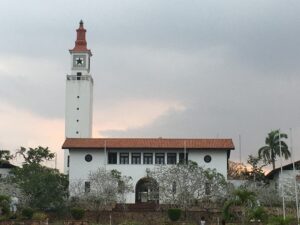Panelists urge prioritised funding of existing public universities
 Panelists have expressed divergent views on whether Ghana should build more public universities or expand current ones to improve access, quality, and sustainability.
Panelists have expressed divergent views on whether Ghana should build more public universities or expand current ones to improve access, quality, and sustainability.
They urged the government to prioritise increased funding in public universities instead of establishing new ones.
They made the call at the Ghana Academy of Arts and Sciences’ (GAAS) fifth Higher Education Policy Dialogue in Accra.
The event was dubbed ”Motivating High Education Reforms in Ghana-towards Equity and Sustainability.”
The government recently announced the establishment of four more public universities in Bunso, Akrodea in Ahafo, Kintampo and Mampong Ashanti.
Some of the panelists argued that raising public university expenditures would offer access to higher education, promote Ghana’s Free SHS programme, and enhance infrastructure.
Others believed that Ghana should have universities in all 16 regions, and that its public universities should be affiliated with foreign universities.
GAAS policy dialogue was attended by representatives of Ghana’s public universities including past vice-chancellors, the Ghana Association of University Administrators (GAUA), the Ghana Tertiary Education Commission and the Graduate Students Association of Ghana (GRASAG).
The dialogue aimed to review Professor Christine Adu-Yeboah, Dr. Adams Yunus, and Dr. Lydia Aframea Dankyi’s higher education project.
The panelists noted that certain universities’ infrastructure has been halted due to a lack of funds, causing them to admit fewer students or turn them away.
Some prominent universities have larger intake, leading to congestion in facilities, whereas others have minimal enrollment.
The panelists suggested that new universities should align with global trends like artificial intelligence.
During the conversation, it was revealed that South Africa, for example, had developed colleges to handle police and crime detection, science and innovation, air traffic control, agricultural processing, and energy technology, which Ghana could replicate.
Professor Yayra Dzakadzie, Deputy Director-General of the Ghana Tertiary Education Commission, confirmed the government’s decision to build four new universities.
According to him, this became necessary because there were 102 private universities, with 80 per cent in Accra and Kumasi.
“We need new Universities as and when the need arises. The government’s position of establishing new universities was not a bad one. These universities are donor funded and some are funded by GET Fund. Development partners have adopted some of these universities,’ he said.
Prof. Dzakadzie announced that Ghana would soon have Open Universities, which had been planned for some time.
He said the Ministry of Finance would soon give public universities the green light to hire or employ more staff.
Professor Lydia Aziato, Vice Chancellor, University of Health and Allied Sciences, Ho noted that new universities were struggling in terms of Information Communication Technology, roads, and fields for practical.
She called for community and increased government support to address the challenges of new universities.
The GAAS project on Higher Education found that public university education in Ghana had grown significantly during the past 30 years.
Again, there was a significant increase in student enrolment and a “considerable spatial balance because of the location of new universities spread across the 10 old administrative regions of the country.”
The project also found that the number of public universities increased from five (5) in 1993 to 25 in 2023.
It also revealed an increase in students’ enrolment from 15,365 in the 1993/94 academic year to 361,804 in 2022.
This was because of the increase in the number of institutions and the introduction of different entry routes, among others.
“Significant improvement in female enrolment evidenced by a gender parity index from 0.62 in the year 2000 to 0.9 in the year 2020 and a ratio of 35.65 in the year 2021” the project disclosed.
The policy calls for equitable access, transformative knowledge, curriculum changes to meet market/industry needs, funding, and strict enforcement of existing protocols to ensure higher education is accessible to all, including the underprivileged.
Source: GNA
